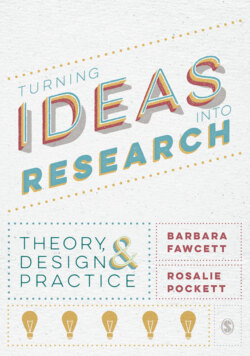Читать книгу Turning Ideas into Research - Barbara Fawcett - Страница 17
На сайте Литреса книга снята с продажи.
Academic–practitioner partnerships
ОглавлениеAcademic–practitioner partnerships are now a feature of the contemporary academic environment, with universities openly encouraging partnerships with industry. In the human services, health and social care sectors, collaborative and inclusive relationships have taken on distinctive qualities.
The academic–practitioner partnership draws on the strengths of each to complete the research. The expertise of practitioners is essential in informing the design of the study, enabling access to the sample group or data and the interpretation of the results. The expertise of the academic researcher is essential in the preparation of the ethics committee application, ensuring the methodological rigour of the study and the data analysis, and providing support in the final documentation of the studies for publication.
An example of academic–practitioner partnerships is where workers join an established research team within their workplace. Collaborations between social work and psychology within the cancer field have been significant in the developing discipline of psycho-oncology. In Australia, like many developed countries, funding for cancer research into the causes, treatment and management of the disease has been a significant priority of government for many years. Recently funding opportunities for research that involves bio-psychosocial approaches have been provided by organizations such as state-based cancer councils and cancer institutes. The interdisciplinary nature of these research partnerships has provided opportunities to explore both bio-psychosocial and inclusive and participatory understandings as part of the research process. The following example illustrates this type of partnership in the workplace. At a large metropolitan teaching hospital in Sydney, members of an interdisciplinary gynaeoncology team joined a practice reference group for a small funded study investigating the effectiveness of self-help groups as a support mechanism for cancer survivors and their families (Butow et al., 2005). The practice reference group included medical, nursing, psychology, social work and consumer representatives working in partnership with university academics who led the research. This group played an important role in the analysis and interpretation of data drawing on their practice knowledge and expertise. Their participation in the group helped develop linkages between practice, research and policy, and recommendations from the study were made to funding bodies to improve policy and practice approaches in this area.
The research partnership has resulted in further funding being received by the group for a range of mixed method studies, for example, Hodgkinson et al. (2007a, 2007b) and Hobbs (2008). A number of publications in refereed national and international health, psychology and social work journals encouraged all members to write for publication with authorship attributed in terms of the article development, the theme being documented and the journal to which the manuscript was submitted. The publication goals that were incorporated into the project enabled the trustworthiness and rigour of the studies to be assured through both internal and external peer review.1
